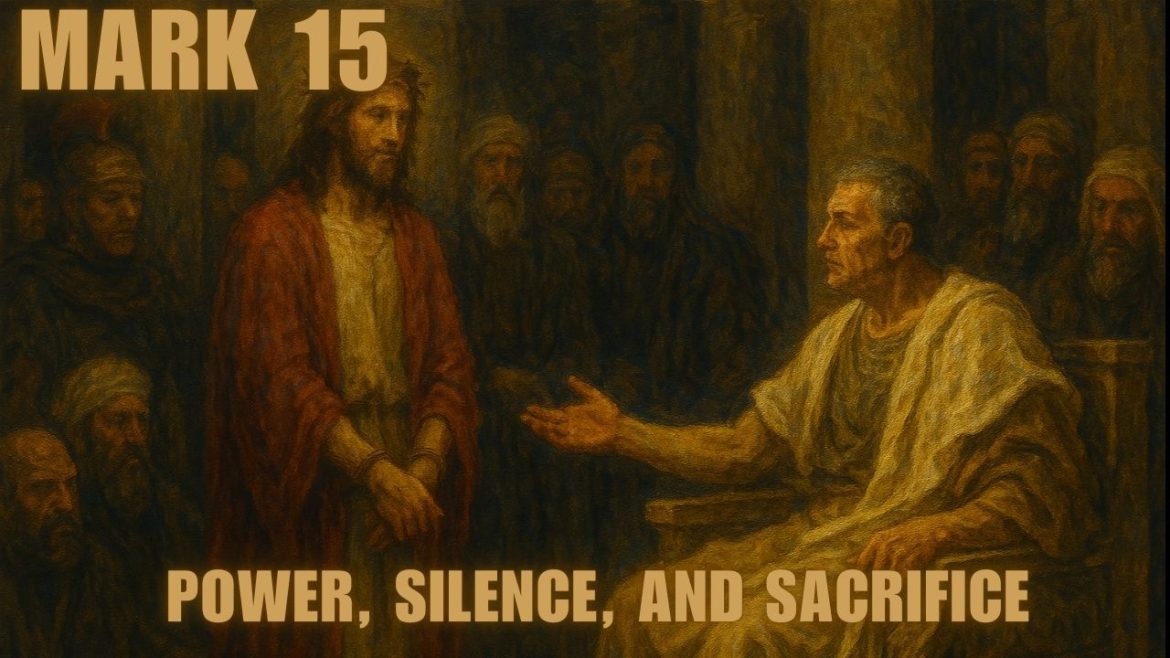There’s something jarring about how quickly Mark 15 moves. No fluff, no side notes—just the brutal, raw march toward the crucifixion of Jesus. It’s the final chapter in a life that redefined love, justice, and sacrifice. The details are specific, painful, and purposeful. Why did Jesus stay silent? Why was Barabbas released? Why did a Roman soldier—of all people—see the truth first? This chapter isn’t just about Jesus’ death. It’s about who we are, who He is, and what all of this means for the world today.
Jesus Before Pilate: Silence in the Face of Power
Mark 15 opens with Jesus bound and handed over to Pilate. It’s early morning, possibly before sunrise. The chief priests waste no time—they want Jesus gone. Pilate questions Him directly: “Are you the King of the Jews?” And Jesus’ response is so cryptic—“You have said so.” No defense. No plea. Just calm, unsettling silence.
Pilate, a seasoned Roman governor, was likely used to fear-driven responses, begging, even manipulation. But Jesus stands apart. His silence amazes Pilate. This isn’t weakness; it’s strength. In a world where noise often equals power, Jesus flips the script. He speaks through silence.
The Crowd Chooses Barabbas: A Mirror of Us All
Pilate wants a way out. He’s aware that envy, not justice, is driving the chief priests. So he offers a tradition: release one prisoner for Passover. On one side: Barabbas—a known rebel and murderer. On the other: Jesus—the peaceful preacher. Surely the crowd will choose wisely, right?
Wrong. The crowd, stirred by the religious leaders, demands Barabbas. When Pilate asks, “What should I do with the one you call King of the Jews?” they cry, “Crucify him!” Pilate pushes back—“What evil has he done?”—but the noise wins. He gives in.
Barabbas is released. And here’s the deeper meaning: Barabbas means “son of the father.” He walks free while Jesus, the true Son of the Father, takes the cross. It’s substitution in the rawest form. We are Barabbas—guilty and freed by grace.
Mockery, Pain, and the Walk to Golgotha
Jesus is now in the hands of the soldiers. They’re not just following orders—they’re having a cruel celebration. A robe. A crown of thorns. A fake coronation. Mockery at its finest. And then the beatings. It’s not just physical—it’s spiritual humiliation.
Too weak to carry the cross, Jesus is helped by Simon of Cyrene. A man from Africa. Not a random detail—Mark mentions Simon’s sons, Alexander and Rufus, because they likely became believers. Even in suffering, Jesus is drawing people in.
They reach Golgotha—the Place of the Skull. The place where death is a public spectacle. And yet, this place becomes sacred ground.
The Crucifixion: The Turning Point of History
Jesus is offered wine mixed with myrrh—a numbing agent. He refuses. He wants to be fully present in suffering. His clothes are taken, lots are cast, and a sign is nailed above: “King of the Jews.” It’s meant to be ironic. But it’s true.
Crucified between two criminals, Jesus becomes the mocked King. Religious leaders jeer. Even the robbers join in. “Save yourself!” they taunt. But He came not to save Himself, but to save us.
At noon, darkness falls. Creation itself mourns. For three hours, the sun hides. Then Jesus cries out: “My God, my God, why have you forsaken me?” These words from Psalm 22 echo the depths of suffering—and also hint at hope. That Psalm ends in triumph.
Then He dies.
A Torn Curtain and a Roman Confession
As Jesus breathes His last, the curtain in the temple is torn in two. Not from bottom to top—but from top to bottom. God did it. The curtain separated people from God’s presence. Now, because of Jesus, the barrier is gone. Access is open.
And then—shockingly—it’s a Roman centurion who gets it. Not the disciples, not the priests, not the crowd. A Gentile soldier looks at the broken body of Jesus and says, “Truly this man was the Son of God.”
This is the first human declaration of Jesus as “the Son of God” in Mark’s gospel. From the margins, truth emerges.
The Faithful Women and a Quiet Burial
While the men have scattered, the women stay. From a distance, but still present. Mary Magdalene. Mary the mother of James. Salome. Faithful witnesses.
Then Joseph of Arimathea steps forward—a council member who takes a risk. He asks Pilate for the body. Pilate is surprised Jesus is already dead, but confirms it and releases the body.
Jesus is wrapped in linen and laid in a tomb. A stone seals the entrance. The story seems over. But it’s not.
Lessons for Today: Power, Silence, and the True King
Mark 15 reminds us that justice isn’t always loud, and truth isn’t always popular. Jesus’ silence in the face of lies teaches us the strength of restraint. Pilate’s compromise shows the cost of appeasing the crowd. And Barabbas’ freedom reflects our own redemption story.
In the end, we’re invited to see Jesus not just as a tragic figure, but as the victorious Son of God. His death opens the way to God. His suffering reveals divine love. And his apparent loss sets the stage for resurrection.
Conclusion: A Love That Takes Our Place
The story of Mark 15 isn’t just historical—it’s deeply personal. We are the ones who shout, who run, who deny, and yet… we are also the ones Jesus dies for. In our place. For our freedom.
The curtain is torn. The way is open. The centurion’s words still echo: “Truly this man was the Son of God.” May we echo them, too—not just with our lips, but with our lives.

